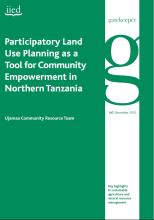Land Library Search
Through our robust search engine, you can search for any item of the over 73,000 highly curated resources in the Land Library.
If you would like to find an overview of what is possible, feel free to peruse the Search Guide.
/ library resources
Showing items 1 through 9 of 10.The first universal, legally binding global climate accord signed at the 21st session of the Conference of Parties (COP) in Paris in 2015 committed to long-term goals for “holding the increase in the global average temperature to well below 2°C above pre-industrial levels and to pursue efforts to
The first universal, legally binding global climate accord signed at the 21st session of the Conference of Parties (COP) in Paris in 2015 committed to long-term goals for “holding the increase in the global average temperature to well below 2°C above pre-industrial levels and to pursue efforts to
While the guarantees provided in the Katiba mark an extraordinary achievement for women’s land rights, many more steps are needed to reach gender-equitable land ownership in Tanzania.
Wildlife Management Areas (WMAs) have the potential to benefit both people and wildlife in Tanzania. But are Tanzanian communities earning enough from WMAs to want to protect the wildlife that live on their land?
Communal lands are central to the livelihoods of many Tanzanians, particularly to pastoralists and hunter-gatherer groups. But a number of factors can undermine the security of these lands remaining ‘communal,’ in turn threatening the livelihoods of many people and cultures.
The first draft of the Tanzanian constitution incorporates many provisions that will improve the rights and interests of pastoralists, huntergatherers and women in these communities.
In northern Tanzania, new grassroots groups called Women’s Rights and Leadership Forums (WRLFs) are mobilizing women and men in pastoralist communities to promote and defend local land rights.
This chapter addresses issues related to securing access and rights to resources, and gaining benefits from the resource within the context of one community-based initiative in the village of Ololosokwan in Tanzania.
This paper presents several case studies to show how the Ujamaa Community Resource Team (UCRT) has been working within Tanzania’s legal and policy framework to support a diverse range of pastoralists, agro-pastoralists and hunter-gatherers, all of whom face fundamental threats from external appro








